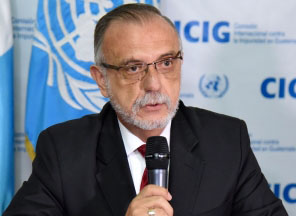GUATEMALA CITY, (Reuters) – Guatemala’s top court said yesterday it had given the government 48 hours to explain why it barred the head of a U.N. anti-corruption agency from entering the country, following legal appeals of the decision by his supporters.
The administration of President Jimmy Morales said on Tuesday it had barred Ivan Velasquez, head of the International Commission Against Impunity in Guatemala (CICIG), from entry and asked the United Nations to send a replacement.
Morales has been in a long-running dispute with Velasquez, who has tried to impeach the president for corruption and also targeted members of his family over suspected graft. Morales, a former comedian, has denied any wrongdoing.
The government accuses the CICIG leader of undermining Guatemala’s stability and its justice system. But following the order to deny him entry, the country’s human rights ombudsman and other supporters of Velasquez appealed the decision.
“The presidency and the National Security Council were asked to submit reports because four appeals were presented yesterday questioning the president’s decision,” said Martin Guzman, secretary general of Guatemala’s Constitutional Court.
The Guatemalan government has 48 hours to respond to the court’s requests on the Velasquez ban, Guzman said.
If the government fails to justify its decision, a provisional appeal against his expulsion could be granted, allowing Velasquez to return.
A few dozen people protested the CICIG’s treatment outside the court, accusing the government of corruption and offering their support for Velasquez, a veteran Colombian prosecutor.
Velasquez met in the United States yesterday with Guatemalan-born U.S. Representative Norma Torres, who in a statement called the decision to bar the CICIG chief “ridiculous” and accused Morales of trying to protect himself from investigation.
The latest tensions followed an announcement on Friday by Morales that the commission’s mandate would end next September. In it, Morales attacked the CICIG, which helped bring down his predecessor as president with a corruption probe.

